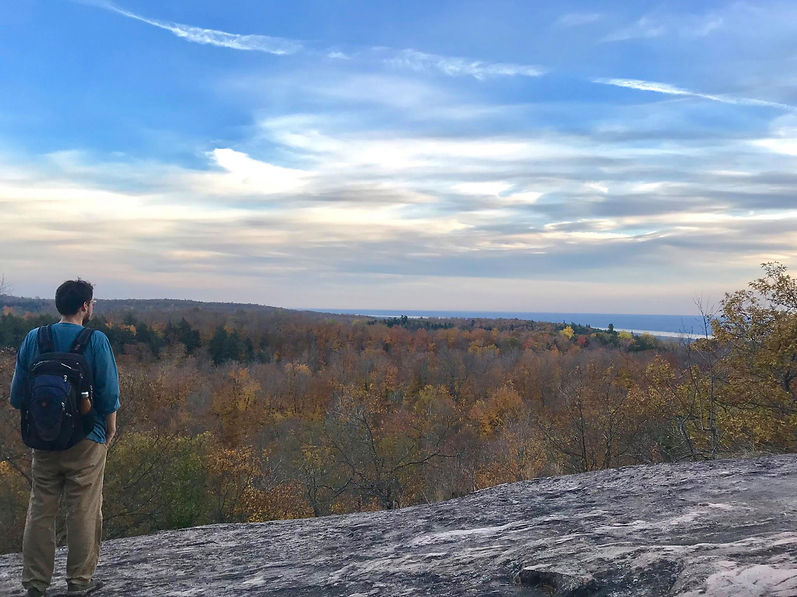
CHRISTOPHER ANGELL, PhD
Evolutionary ecologist and educator
Welcome to my home page! I am an evolutionary ecologist based at Earlham College in Richmond, Indiana. I'm interested in animal life histories and insect biodiversity.
ABOUT ME
I am a Visiting Assistant Professor of Biology at Earlham College. My research focuses on a variety of ecological and evolutionary questions in animals, ranging from behavior and life histories to evolutionary genetics. So far in my scientific career, I've had the pleasure of working with several different animal species, including flies, turtles, crustaceans, and sea anemones.
During my PhD at the University of Ottawa, I investigated the causes and consequences of aging (senescence) in a wild population of antler flies. These charming little flies live only on discarded moose and deer antlers, where the males live out brief lives of "combat and lust," defending territories to attract females.
My current research includes projects related to insect biodiversity and maternal effects in water fleas (Daphnia magna).
I am also passionate about science education and outreach. For several years, I worked as an exhibit designer and marketing assistant for the Joseph Moore Museum in Richmond, Indiana.
Photo courtesy of Samantha Stephens

MY RESEARCH

TRANSGENERATIONAL PLASTICITY
When environmental conditions change, populations can't adapt unless some individuals have gene variants that allow them to be successful in the new environment—or can they? In some cases, parents that have acclimated to environmental stress within their lifetime can pass that benefit onto their children without a genetic component.
My research in this area uses the tiny (and oddly cute) crustacean Daphnia magna t0 see how animals respond to stressful conditions, such as high temperature, over generations. Daphnia mostly reproduce asexually, giving live birth to clones of themselves, and we can use this fact to almost completely eliminate trait variation caused by genetic differences. Instead, if offspring traits depend on the environment by the mother, it has to be due to non-genetic factors.
Understanding transgenerational plasticity will shed light on how wild organisms may survive (or not) as environments continue to rapidly change around the world.
BIODIVERSITY & SYSTEMATICS
Insects are by far the most diverse group of animals, and we're only scratching the surface of understanding their biodiversity. Biodiversity research is critical for ecology and conservation, good phylogenetic hypotheses are necessary for investigating the evolution of species and traits, and reliable identification guides are the bedrock of any field study involving insects.
My interest is in the diversity and systematics of flies (Diptera), a widespread and important, but underappreciated, order of insects. I use both traditionally collected specimens and photographic community science data to study the biodiversity of our small two-winged neighbors.


INSECT LIFE HISTORY
Aging (or senescence) is widespread among multicellular organisms, even though it causes old individuals to lose fitness. Neither the physiology nor the evolution of senescence is fully understood, and it represents an important frontier for biological research.
Most research on senescence has been conducted on either short lived animals (nematodes, fruit flies, mice) in laboratory settings, or long lived vertebrates in the wild. Current theory predicts that senescence has evolved in response to extrinsic mortality factors, such as predation or resource limitation, which are present in nature but severly reduced in the lab. This may have produced biased or misleading results in lab experiments!
Antler flies, with high site fidelity and short adult life span, provide a rich opportunity to study the evolutionary ecology of aging in the wild, without the prohibitive time and resource costs required for vertebrate research.
In 2016, I had the pleasure of speaking about my research with Tom Spears from the Ottawa Citizen as part of their "Science of Spring" series, and you can check out the interview here!
Photo courtesy of Antoine Morin

PUBLICATIONS
SELECTED PUBLICATIONS
You can see a complete list of my publications here, or view them by topic or by taxon.
Angell CS and Rundle HD. 2025. Shed antlers as a larval environment: antler quality and adult performance in wild Protopiophila litigata (Diptera: Piophilidae). The Canadian Entomologist 157: e12. doi
Angell CS, Gaimari SD, and Woźnica, AJ. 2024. New records of three introduced heleomyzid flies (Diptera: Heleomyzidae) in western North America. The Canadian Entomologist 156: e16. full text / doi
Giordani G, Tuccia F, Martín-Vega D, Angell C, Pradelli J and Vanin S. 2023. Morphological and molecular characterization of puparia of Piophilidae species of forensic relevance. Medical and Veterinary Entomology 37: 339-358. pdf / doi
Angell CS, Janacek R, and Rundle HD. 2022. Maternal and paternal age effects on male antler flies: a field experiment. The American Naturalist 199: 436-442. pdf / doi
Angell CS, Oudin MJ, Rode NO, Mautz BJ, Bonduriansky R, and Rundle HD. 2020. Development time mediates the effect of larval diet on ageing and mating success of male antler flies in the wild. Proceedings of the Royal Society B 287: 20201876. pdf / doi
Yun L, Chen PJ, Kwok KE, Angell CS, Rundle HD, and Agrawal AF. 2018. Competition for mates and the improvement of nonsexual fitness. Proceedings of the National Academy of Sciences 115: 6762-6767. pdf / doi
CONTACT ME
using the form at right or at
csangell11 (at) earlham (dot) edu
